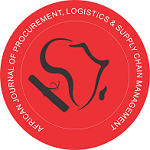Ofori Issah1|2Samuel Agyei Baah|3Evelyn Appiah-Kubi |4Henry Kwame Afriyie
1Department of Supply Chain & Information System, KNUST Business School, KNUST
1,2,3*Christ Apostolic University College, Kumasi
*Correspondence: Ofori Issah, email: kwabenaofori35@gmail.com
Abstract
In the modern business landscape, procurement strategies have emerged as essential tools for achieving competitive advantage. As organizations face increasing pressure to deliver superior products and services while maintaining cost-efficiency, the adoption of effective procurement strategies becomes crucial for long-term success (Cousins et al., 2019). These strategies encompass various practices such as cost management, supplier relationship management, and sustainable sourcing, which collectively aim to improve operational efficiency, reduce costs, and drive innovation (Brammer & Walker, 2021). While research has extensively examined the direct impact of procurement strategies on organizational performance, less attention has been paid to understanding the role of project performance as a moderating factor in this relationship (Meng, 2020). Project performance, which refers to the successful execution of projects in terms of time, cost, and quality, is often overlooked in the context of procurement strategies. However, project performance is an essential determinant of whether procurement strategies achieve the desired competitive advantage (Muller et al., 2021). This study follows an explanatory research design, which is primarily aimed at understanding the cause-and-effect relationships among variables (Saunders et al., 2019). The explanatory approach explored how procurement practices affect competitive advantage, and how project performance moderates this relationship. This design is appropriate for testing hypotheses that seek to explain the impact of project performance as a moderator in this relationship. A quantitative approach was adopted, as it allows for the measurement of relationships and the testing of hypotheses using statistical techniques (Bryman & Bell, 2019). The quantitative approach is suitable for this study since it involves numerical data that can be analyzed to identify the strength and direction of relationships. Data was collected through primary sources using a structured questionnaire. The findings of the study statistically indicate that procurement strategies have a positive and significant influence on competitive advantage. Project performance has a positive and significant influence on competitive advantage. Project performance positively and significantly moderates the relationship between procurement strategies and competitive advantage. The study recommends that organizations should enhanced execution and efficiency, embrace adaptability and innovation, ensure strategic alignment and goal achievement, risk mitigation and, operational excellence.
Keywords: Procurement Strategies, Competitive Advantage, Project Performance
Citation: Ofori., I., Baah., S., A., Appiah-Kubi., E., & Afriyie., K., H., (2025), “Procurement Strategies and Competitive Advantage: Assessing the Impact of Project Performance as a Moderator””, African Journal of Procurement, Logistics & Supply Chain Management Society 2025, 8(01): 74-88, DOI: https://dx.doi.org/10.4314/ajplscm.v8i1.5


